-
01-01-2016
Epistemology of nursing care: a reflection on its foundations
Revista Brasileira de Enfermagem. 2016;69(6):1240-1245
Abstract
Epistemology of nursing care: a reflection on its foundations
Revista Brasileira de Enfermagem. 2016;69(6):1240-1245
DOI 10.1590/0034-7167-2016-0331
Views0See moreABSTRACT
Objective:
to reflect on nursing care and its epistemology from its historical, theoretical, philosophical, spiritual dimensions and as a social practice.
Method:
discussions originated in the discipline “Epistemology of caring”, from the graduate nursing program of the School of Nursing, Federal University of Minas Gerais, and in critical analysis of nursing literature together with the professional practice of the authors.
Results:
we identified the necessity of developing a critical conscience on health care provision, research, and teaching, as well as on challenges in maintaining high standards of working interpersonal relationships, which has a profound impact on population health.
Conclusion:
we suggest the rescue of integrality, humanization, unity, and spirituality in researches and practices of individual, familiar, and community care, as an advance in incorporating epistemology of caring in nursing.
-
01-01-2016
Health needs and nursing care
Revista Brasileira de Enfermagem. 2016;69(6):1236-1239
Abstract
Health needs and nursing care
Revista Brasileira de Enfermagem. 2016;69(6):1236-1239
DOI 10.1590/0034-7167-2016-0128
Views0See moreABSTRACT
Objective:
to present the concept of needs according to different approaches to discuss the possibility of health care that incorporates a broader view of human vulnerabilities in health services.
Methods:
the arguments are founded on nursing theorists who worked on the construction of frameworks relevant to care, based on needs and on philosophers who show the possibility of identifying the vulnerabilities of human beings, defending art as a therapeutic instrument that can promote health care.
Conclusion:
although care can acquire a new dimension with the introduction of art, according to certain perspectives, philosophical studies on ethics and aesthetics should be resumed to identify human vulnerabilities that can in fact be compensated by sensible understanding of the outer world. To incorporate art in nursing care requires studies from theorists to be recovered, deepening concepts and working on empirical investigations for their adequate use.
-
01-01-2016
Case studies and role play: learning strategies in nursing
Revista Brasileira de Enfermagem. 2016;69(6):1231-1235
Abstract
Case studies and role play: learning strategies in nursing
Revista Brasileira de Enfermagem. 2016;69(6):1231-1235
DOI 10.1590/0034-7167-2016-0277
Views0See moreABSTRACT
Objective:
to report professors’ experience in a public university of Southern region of Brazil using case studies and role play as learning strategies for nursing care of hospitalized adults.
Method:
learning experience report from the Nursing Care of Adults I class of nursing undergraduate course.
Results
the development of case studies and role play considered health care needs from epidemiological profile of chronic noncommunicable diseases morbidity and mortality, nursing as an assisting method, and social aspects of hospitalized individuals. Role play planning was made by creating a stage in laboratory of practices and dialogues comprising students and professors interaction.
Conclusion
case studies and role play encouraged students to active search for learning and brought theory closer to real health care situations.

-
01-01-2016
Politicy of care in the criticism towards gender stereotypes
Revista Brasileira de Enfermagem. 2016;69(6):1223-1230
Abstract
Politicy of care in the criticism towards gender stereotypes
Revista Brasileira de Enfermagem. 2016;69(6):1223-1230
DOI 10.1590/0034-7167-2016-0441
Views0See moreABSTRACT
Objectives:
analyze gender inequalities among Brazilian women in Portugal and in contemporary nursing based on care politicity in the light of gender; disclose oppression of the female produced by the stereotypes that look upon women as natural caregivers; point out politicity to deconstruct gender stereotypes.
Method:
theoretical reflection with narrative review of literature to analyze classic references in the feminist epistemology combined with the care politicity thesis.
Results:
the similarities between the stereotypes of the Brazilian Eves and the Portuguese Maries as either the sexualized or sanctified nurse are inserted in the Jewish-Christian moral genealogy that reaffirms the subservience of the female to the male.
Conclusion:
by attaching priority to care that needs non-care to expand the possibilities of care giving, the theoretical assumption of politicy of care can contribute to subvert the stereotypical images of Brazilian women in Portuguese lands and in contemporary nursing.
-
01-01-2016
Strategies for thirst relief: integrative literature review
Revista Brasileira de Enfermagem. 2016;69(6):1215-1222
Abstract
Strategies for thirst relief: integrative literature review
Revista Brasileira de Enfermagem. 2016;69(6):1215-1222
DOI 10.1590/0034-7167-2016-0317
Views0See moreABSTRACT
Objective:
to analyze the strategies used to relieve the thirst of hospitalized patients.
Method:
an integrative review, for which the databases PubMed, LILACS, CINAHL and the group of references organized by the Group for Study and Research of Thirst were selected for the search of primary studies, with the keywords: thirst, ice, cold, intervention, nursing care, artificial saliva.
Results:
the review sample was composed of ten primary studies. The strategies found were: low temperature using frozen gauze, ice chips, and cold water, menthol associated with cold strategies, chewing gum, acupressure, and the use of a thin straw, substitute saliva, and early fluid ingestion.
Conclusion:
the temperature was presented as a predominant and effective strategy to relieve the thirst for surgical patients in intensive care and hemodialysis treatment.

-
01-01-2016
Care of the self and power relations: female nurses taking care of other women
Revista Brasileira de Enfermagem. 2016;69(6):1204-1214
Abstract
Care of the self and power relations: female nurses taking care of other women
Revista Brasileira de Enfermagem. 2016;69(6):1204-1214
DOI 10.1590/0034-7167-2016-0021
Views0See moreABSTRACT
Objective:
to analyze the care of self of female nurses and the power relations established by them in the care of other women.
Method:
integrative review of literature published between 2005 and 2015. There were 25 publications in the sample.
Results:
qualitative state of the art with reference domain of a liberating perspective, based on humanization, autonomy and empowerment as a risk reduction strategy in the practice of care to women. The findings suggest solidified power relations among female nurses and women, focused on professional domain concentrated on nurse education under the patriarchal and society’s normalization discourse. Some studies consider the importance of understanding power in a capillary way, operating on the bodies of individuals.
Conclusion:
there is little discussion about the care of self of nurses and the effects on their professional practice, indicating gaps in knowledge in this field.

-
01-01-2016
Nursing competencies in promoting the health of individuals with chronic diseases
Revista Brasileira de Enfermagem. 2016;69(6):1195-1203
Abstract
Nursing competencies in promoting the health of individuals with chronic diseases
Revista Brasileira de Enfermagem. 2016;69(6):1195-1203
DOI 10.1590/0034-7167-2016-0312
Views0See moreABSTRACT
Objective:
to identify nurse’s competencies related to health promotion of individuals with chronic cardiac disease, in the light of the Galway consensus.
Method:
integrative literature review was conducted to search for studies published between 2010 and 2014 in the databases LILACS, BDENF, IBECS; and PubMed in February 2015. The 21 included studies were analyzed according to the eight domains of competence: Catalyzing change, Leadership, Evaluation, Planning, Implementation, Assessment, Advocacy and Partnerships.
Results:
all domains of competence were included in the nursing interventions in health promotion of chronic cardiac patients, and the Planning and Evaluation were the most evident competences.
Conclusion:
the results of this research highlighted the nurse as an agent capable of operating care management, in order to improve coordination of the latter with work and education and, thus, the health care of the population.

-
01-01-2016
Assisted therapy with dogs in pediatric oncology: relatives’ and nurses’ perceptions
Revista Brasileira de Enfermagem. 2016;69(6):1188-1194
Abstract
Assisted therapy with dogs in pediatric oncology: relatives’ and nurses’ perceptions
Revista Brasileira de Enfermagem. 2016;69(6):1188-1194
DOI 10.1590/0034-7167-2016-0243
Views0See moreABSTRACT
Objective:
to understand the perception of nursing staff professionals and legal guardians of children and adolescents with cancer regarding Assisted Therapy with dogs.
Method:
qualitative study based on participant observation conducted with 16 participants in a reference hospital of child cancer. We applied an in-depth interview and interpreted the data according to a content analysis technique.
Results:
the practice is admittedly beneficial to participants despite the fact they do not understand its true objectives and therapeutic applications. Participants only associate it with something distracting and entertaining without realizing the occurrence of a more complex process behind it, which comprises changes besides the emotional ones (more easily perceived).
Conclusion:
the perceptions of participants reinforce recommendations that can be applied in the hospital environment, also showing that the therapy in question can become an effective technology to promote the health of children and adolescents with cancer.
-
ORIGINAL ARTICLE12-04-2023
Burnout, ethical climate and work organization in covid-19 intensive care units: mixed method study
Revista Brasileira de Enfermagem. 2023;76:e20220684
Abstract
ORIGINAL ARTICLEBurnout, ethical climate and work organization in covid-19 intensive care units: mixed method study
Revista Brasileira de Enfermagem. 2023;76:e20220684
DOI 10.1590/0034-7167-2022-0684
Views0See moreABSTRACT
Objectives:
to analyze the association between burnout and the perception of the ethical climate in nursing professionals in the covid-19 Intensive Care Unit and the relationship with the organization of work from the perspective of managers of these units.
Methods:
mixed method study conducted in three university hospitals in southern Brazil from December 2021 to March 2022. A cross-sectional study was developed with 110 nursing professionals, followed by an exploratory-descriptive study through semi-structured interviews with six managers. Descriptive and analytical statistics and discursive textual analysis were used.
Results:
the prevalence of burnout was 10% and the perception of negative ethical climate was 24.5%. The association between burnout and ethical climate revealed overload and fatigue during working hours, related to tension, fear, and stress that emerged from the consequences of the organization and relations of work in the covid-19 Intensive Care Unit.
Conclusions:
there was an association between burnout and ethical climate and elements of the work organization.
-
ERRATUM02-26-2024
ERRATUM
Revista Brasileira de Enfermagem. 2024;77(1):e20160061
Abstract
ERRATUMERRATUM
Revista Brasileira de Enfermagem. 2024;77(1):e20160061
DOI 10.1590/0034-7167.20247701e03
Views2In the article “Nurses in the labor market: professional insertion, competencies and skills”, with DOI number: , published in Revista Brasileira de Enfermagem, 2017;70(6):1220-6, on page 1225:Include before REFERENCES:[…]See more -
ERRATUM06-14-2024
ERRATUM
Revista Brasileira de Enfermagem. 2024;77(2):e2024n2e06
Abstract
ERRATUMERRATUM
Revista Brasileira de Enfermagem. 2024;77(2):e2024n2e06
DOI 10.1590/0034-7167.20247702e06
Views2In the article “Is there scientific relevance to the plot of films and documentaries about eating disorders?”, with DOI number: , published in Revista Brasileira de Enfermagem, 2024;77(1):e20220547, page 7:Where it read:[…]See more -
ORIGINAL ARTICLE07-29-2024
Educational technology for multidisciplinary training for managing waiting lists for elective patients
Revista Brasileira de Enfermagem. 2024;77(3):e20230299
Abstract
ORIGINAL ARTICLEEducational technology for multidisciplinary training for managing waiting lists for elective patients
Revista Brasileira de Enfermagem. 2024;77(3):e20230299
DOI 10.1590/0034-7167-2023-0299
Views1See moreABSTRACT
Objectives:
to construct and assess an educational technology for managing patient waiting lists for multidisciplinary training.
Methods:
study supported by Instructional Design – ADDIE model, whose stages of construction of educational technology were developed in the form of a multi-professional training course. Its respective content assessment was carried out by a committee of experts from 2021 to 2022. The analysis occurred based on the proportion of content adequacy with 95% Confidence Interval.
Results:
seventeen products were created as educational technology learning objects: five storyboards; four videos; three comic books; two pedagogical action plans; a mind map; and a YouTube® playlist. Nine experts assessed content adequacy, which reached 0.89.
Conclusions:
this educational technology contributes to the performance of professionals who manage waiting lists by reducing inequalities, alleviating differences, in addition to promoting equity in care and good health for patients in the Brazilian Health System.

-
REVIEW11-22-2024
Spirituality and religiosity in children, adolescents and their families in a vulnerable context: a scoping review
Revista Brasileira de Enfermagem. 2024;77(5):e20230425
Abstract
REVIEWSpirituality and religiosity in children, adolescents and their families in a vulnerable context: a scoping review
Revista Brasileira de Enfermagem. 2024;77(5):e20230425
DOI 10.1590/0034-7167-2023-0425
Views1See moreABSTRACT
Objective:
to map evidence in the literature on the spirituality and religiosity of children, adolescents and their families in social vulnerability.
Methods:
this is a scoping review based on the JBI methodology, with the search without delimiting the time period, in English, Portuguese and Spanish, in the Virtual Health Library, PubMed, Embase, Cochrane Library, Scopus and Web of Science databases.
Results:
twenty-two studies were identified. The most studied population were adolescents, followed by children and their families. Regarding the setting, the context of vulnerability related to the low socioeconomic level experienced by these populations was highlighted. Furthermore, spirituality and religiosity were considered important for coping, social support, purpose and strength.
Conclusion:
there is an influence of spirituality and religiosity in the lives of children, adolescents and families, being a protective factor and a source of comfort, playing essential tools for living in context.

-
ORIGINAL ARTICLE12-13-2024
Stress in nursing workers caring for people with COVID-19
Revista Brasileira de Enfermagem. 2024;77(5):e20230542
Abstract
ORIGINAL ARTICLEStress in nursing workers caring for people with COVID-19
Revista Brasileira de Enfermagem. 2024;77(5):e20230542
DOI 10.1590/0034-7167-2023-0542
Views1See moreABSTRACT
Objectives:
to analyze stress from the perspective of nursing workers caring for people with COVID-19 in a public hospital in the Recôncavo region of Bahia.
Methods:
this is an exploratory qualitative study, conducted through semi-structured interviews. The data were analyzed using word clouds, similarity trees, and content analysis.
Results:
nursing workers were exposed to stress while attending to patients with COVID-19. The reported stressors in the workplace included: work overload, lack of planning, speed in performing tasks, fatigue, lack of participation in decision-making, lack of support from management, technological changes, excessive responsibility without preparation, interpersonal conflicts, and professional undervaluation.
Conclusions:
exposure to these stressors leads to emotional exhaustion and demotivation, which were intensified during the COVID-19 pandemic.

-
ORIGINAL ARTICLE01-13-2024
Knowledge, Attitudes, and Practices of nurses regarding blood culture collection
Revista Brasileira de Enfermagem. 2024;77(6):e20230424
Abstract
ORIGINAL ARTICLEKnowledge, Attitudes, and Practices of nurses regarding blood culture collection
Revista Brasileira de Enfermagem. 2024;77(6):e20230424
DOI 10.1590/0034-7167-2023-0424
Views2See moreABSTRACT
Objectives:
to investigate the knowledge, attitudes, and practices of nurses regarding blood culture collection.
Methods:
a cross-sectional study was conducted in five Brazilian public hospitals with 112 nurses. Data were collected using an adapted questionnaire and analyzed through descriptive and inferential statistics.
Results:
nurses who did not consider themselves capable of collecting blood cultures had a 72% lower chance of performing the collection at the recommended site and an 83% lower chance of using the same needle for blood inoculation into the vials. Nurses working in the emergency department had a 75% lower chance of knowing the international benchmark for blood culture contamination rates, and those with less than 5 years in the position decreased their chance of accuracy in this matter by 79%.
Conclusions:
there are gaps in the knowledge, attitudes, and practices of nurses regarding blood culture collection. Standardization of the technique, periodic education, supervision and guidance of the collection team, and process auditing are recommended coping strategies.

-
ORIGINAL ARTICLE01-10-2024
Inventory of ethical problems in mobile pre-hospital care
Revista Brasileira de Enfermagem. 2024;77:e20230539
Abstract
ORIGINAL ARTICLEInventory of ethical problems in mobile pre-hospital care
Revista Brasileira de Enfermagem. 2024;77:e20230539
DOI 10.1590/0034-7167-2023-0539
Views1See moreABSTRACT
Objective:
to construct and validate the content of an inventory of ethical problems experienced by nurses in mobile pre-hospital care.
Method:
a psychometric approach study, developed with the following stages: (1) instrument construction through a theoretical matrix based on deliberative bioethics, scoping review and online qualitative research; (2) content validity by judges; (3) pre-testing with Mobile Emergency Care Service nurses in various Brazilian states. For content validity analysis, the Content Validity Ratio was calculated (CVR>0.45 for judges and CVR>0.35 for the target population).
Results:
the instrument had 44 items, distributed across four dimensions.
Final considerations:
the constructed instrument presented sources of evidence of content validity, providing good psychometric measurements and constituting a useful tool for nurses’ practice in the pre-hospital setting.

-
REVIEW07-29-2020
Frailty syndrome in the elderly: conceptual analysis according to Walker and Avant
Revista Brasileira de Enfermagem. 2020;73:e20190601
Abstract
REVIEWFrailty syndrome in the elderly: conceptual analysis according to Walker and Avant
Revista Brasileira de Enfermagem. 2020;73:e20190601
DOI 10.1590/0034-7167-2019-0601
Views0See moreABSTRACT
Objective:
To analyze the concept of “frailty syndrome” in the literature, according to the method proposed by Walker and Avant.
Methods:
It is a concept analysis, guided by the method proposed by Walker and Avant, made operational through an integrative literature review. The search in a scientific database was carried out using the descriptors: Frail elderly, syndrome, phenotype, geriatric assessment, and aging. The literary corpus comprised 66 studies. Results: The study found the antecedents and attributes (categorized as physical, sociodemographic, and behavioral/environmental) that integrate the signs and symptoms evidenced in the “frailty syndrome,” as well as the consequences of this concept. The variables were analyzed with emphasis on the conceptions that influence the frailty process of the elderly.
Conclusion:
The study demonstrated the complexity arising from the multifactorial genesis of the referred syndrome, emphasizing the specificities of the elderly’s frailty. However, we recommend conducting further research involving the phenomenon in question to understand the construct better.
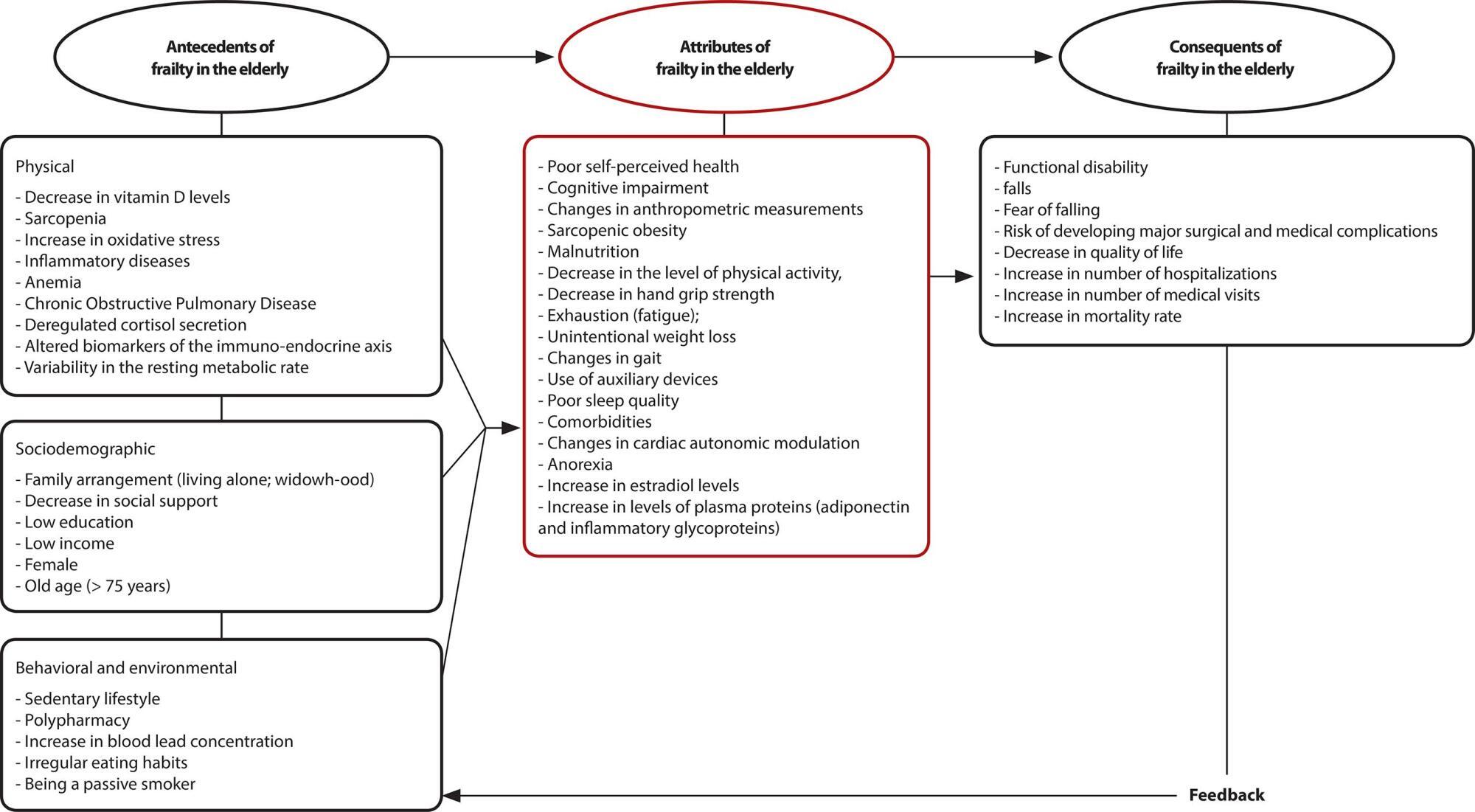
-
ORIGINAL ARTICLE09-16-2019
Tuberculosis: health care and surveillance in prisons
Revista Brasileira de Enfermagem. 2019;72(5):1304-1310
Abstract
ORIGINAL ARTICLETuberculosis: health care and surveillance in prisons
Revista Brasileira de Enfermagem. 2019;72(5):1304-1310
DOI 10.1590/0034-7167-2018-0260
Views0See moreABSTRACT
Objective:
To identify tuberculosis-related health care and surveillance actions in Prison Health Units.
Method:
Cross-sectional study, of quantitative, exploratory and descriptive character. We visited 13 Teams of Prison Health, and nurses and technicians were interviewed regarding epidemiological surveillance instruments, physical structure and materials.
Results:
Search for respiratory symptoms in admission was reported by 6 (46.2%) of the teams, and the smear microscopy was the most requested test. The Logbook of Respiratory Symptoms and the Logbook for Monitoring Tuberculosis Cases were used in 7 (53.8%) institutions. Two of them (15.4%) had a location for sputum collection and 1 (7.7%) had a radiographer. The Directly Observed Therapy was reported in 7 (53.8%) units.
Conclusion:
Health care actions related to the search for respiratory symptoms and Directly Observed Therapy should be expanded, as well as surveillance actions and recording in official documents of the National Tuberculosis Control Program.
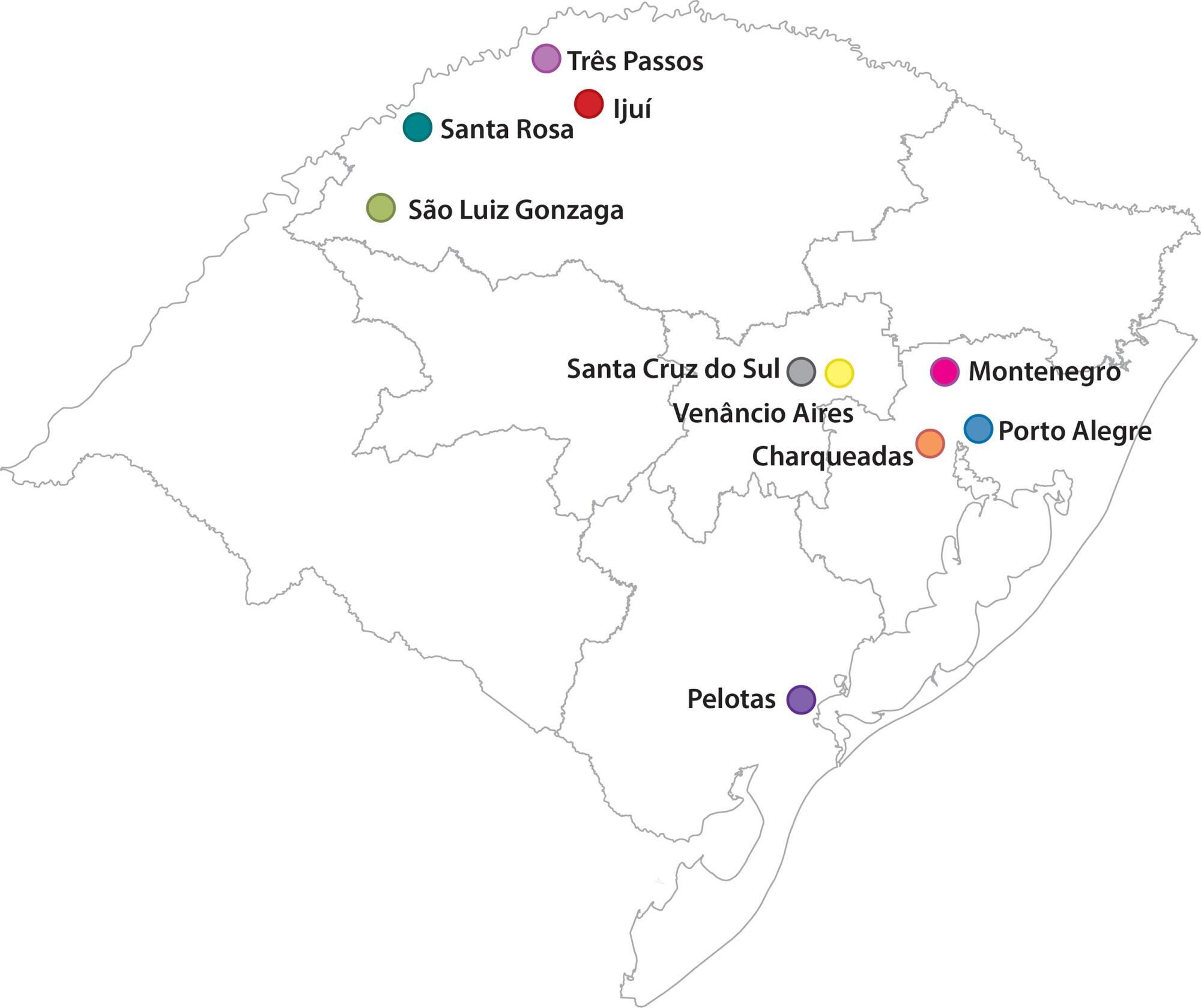
-
04-14-2021
COVID-19 patients in prone position: validation of instructional materials for pressure injury prevention
Revista Brasileira de Enfermagem. 2021;74:e20201185
Abstract
COVID-19 patients in prone position: validation of instructional materials for pressure injury prevention
Revista Brasileira de Enfermagem. 2021;74:e20201185
DOI 10.1590/0034-7167-2020-1185
Views0See moreABSTRACT
Objective:
to perform the content and face validation of a checklist and a banner on pressure injury prevention in patients in prone position.
Method:
this is a methodological study of content and face validation with 26 nurses with specialization. Professionals assessed the checklist and the banner in relation to clarity, theoretical relevance, practical relevance, relation of the figures to the text and font size. The Content Validity Index was calculated for each item, considering one with a value equal to or greater than 0.8 as valid.
Results:
all the actions described in the checklist and in the banner had a Content Validity Index greater than 0.80, with standardization of verbal time and esthetic adjustments in the banner’s layout, as suggested.
Conclusions:
the checklist and the banner were validated and can be used in clinical practice to facilitate pressure injury preventions in patients in prone position.
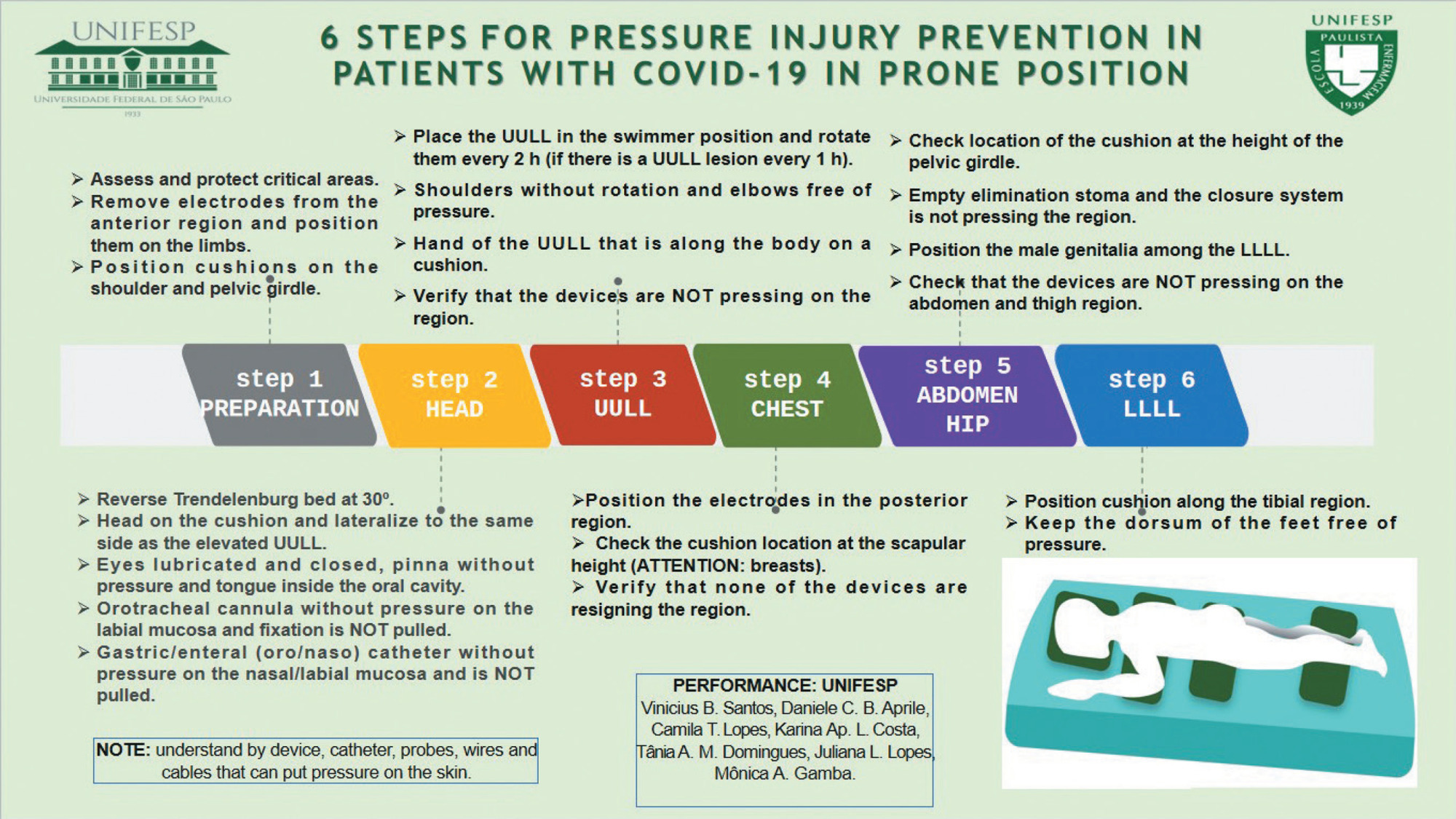
-
02-10-2020
Development of middle-range theories in nursing
Revista Brasileira de Enfermagem. 2020;73(1):e20170893
Abstract
Development of middle-range theories in nursing
Revista Brasileira de Enfermagem. 2020;73(1):e20170893
DOI 10.1590/0034-7167-2017-0893
Views0See moreABSTRACT
Objective:
To identify in the literature how Middle-Range Theories (MRT) are being developed in Nursing.
Method:
Integrative review on the databases Lilacs (Latin American and Caribbean Literature in Health Sciences), Scopus, Cinahl (Cumulative Index to Nursing and Allied Health Literature), Web of Science and PubMed portal, using the keywords middle range theory and nursing, as well its Portuguese correspondents (Lilacs), and the Boolean operator AND. The sample included 25 articles.
Results:
All articles presented concepts related to MRT. Most developed a synthesis picture. Some theories have formulated specific propositions, hypotheses, and names. Only 16 articles cited the methodological framework, while 22 used theories or models for theoretical foundation and 11 carried out literature reviews.
Final considerations:
The development of MRT included the presentation of fundamental concepts, synthesis, propositions, hypotheses and specific name. The MRT is recognized as a way of developing knowledge to guide the nursing practice.
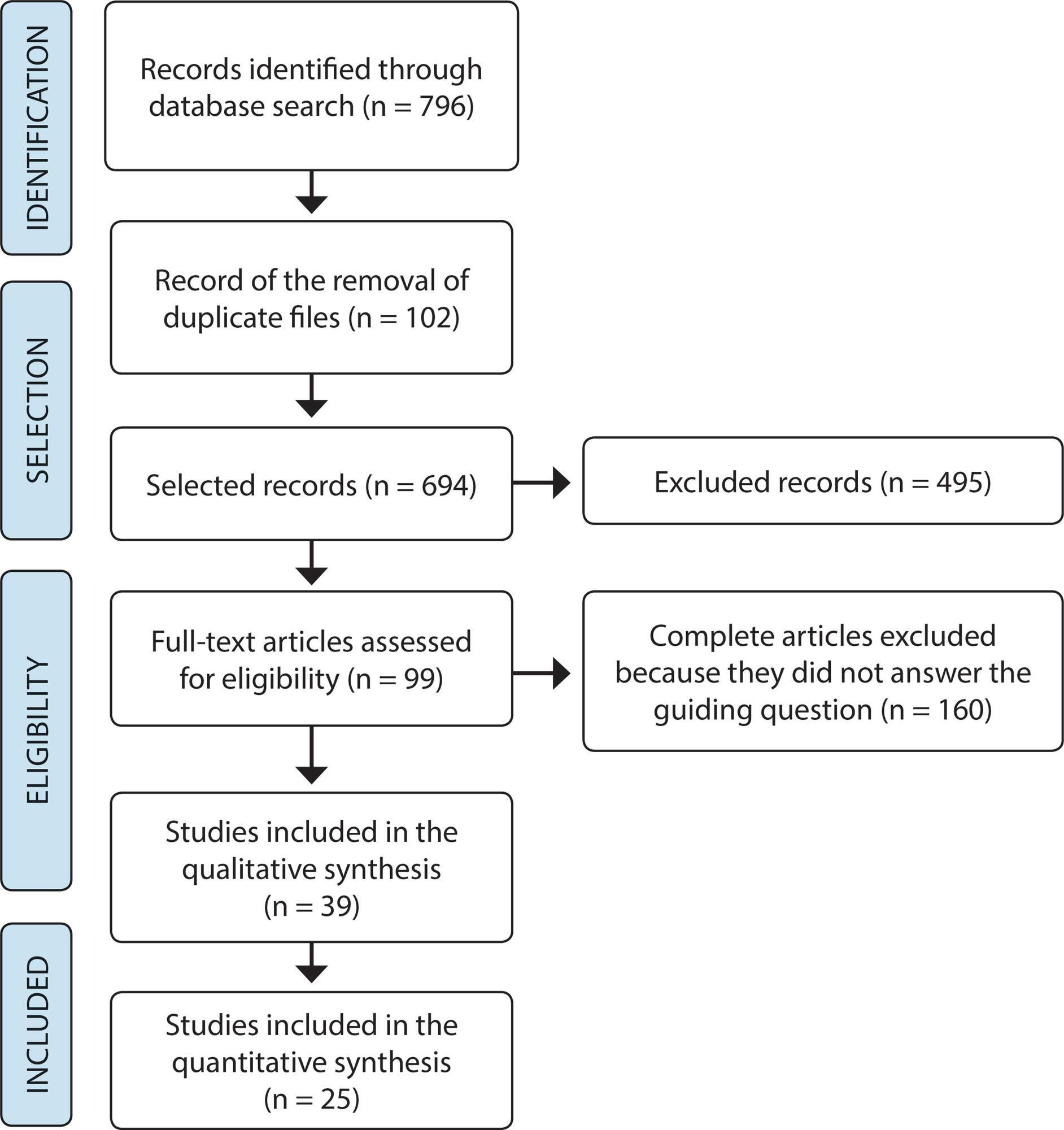
-
09-16-2019
Construct validation: coping with HIV/AIDS in Primary Health Care
Revista Brasileira de Enfermagem. 2019;72(5):1173-1181
Abstract
Construct validation: coping with HIV/AIDS in Primary Health Care
Revista Brasileira de Enfermagem. 2019;72(5):1173-1181
DOI 10.1590/0034-7167-2018-0734
Views0See moreABSTRACT
Objective:
To validate the construct and measure the trustworthiness of a questionnaire aimed at assessing HIV/AIDS coping actions developed by health professionals in Primary Health Care.
Method:
A methodological study carried out with 397 primary health care professionals in two municipalities in the Northeast region of Brazil. The construct validity was developed by the exploratory and confirmatory factor analysis, and the reliability analyzed by the reliability and reproducibility.
Results:
The validation determined six factors retention that composed the six domains of the questionnaire. Internal consistency was 0.91 and quality of the confirmatory analysis adjustment was 0.998 for Goodness of Fit Index. The domains presented Kappa values between 0.833 and 0.997.
Conclusions:
The final questionnaire was composed of 18 items and presented feasibility of application, and potential to evaluate actions for HIV/AIDS control in Primary Health Care.
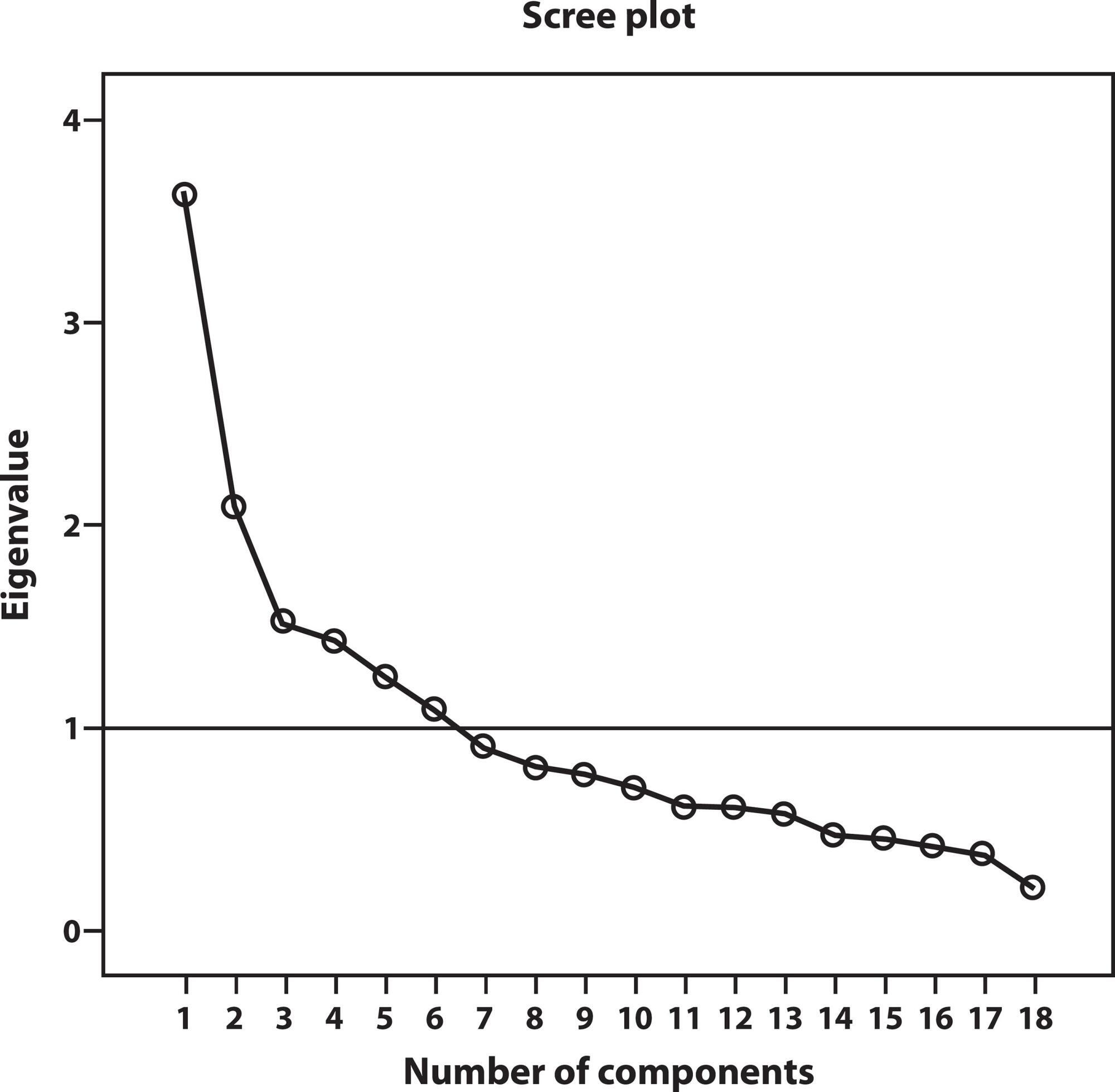
-
ORIGINAL ARTICLE02-10-2020
Stress and health risk behaviors among university students
Revista Brasileira de Enfermagem. 2020;73(1):e20180035
Abstract
ORIGINAL ARTICLEStress and health risk behaviors among university students
Revista Brasileira de Enfermagem. 2020;73(1):e20180035
DOI 10.1590/0034-7167-2018-0035
Views0See moreABSTRACT
Objective:
To analyze the level of stress and its relationship with health risk behaviors among university students.
Method:
Cross-sectional analytical study carried out at a higher education institution in Picos-PI. A total of 377 students were evaluated for socio-demographic and academic variables, stress profile, sleep quality, alcohol use, smoking habits and level of physical activity. The Statistical Package for the Social Sciences (SPSS), version 20.0 was used for data processing and analysis.
Results:
Sleep quality was poor for 65.3% of the subjects, and sleep disturbances were found in 17.0%. Stress was observed in 68.7% of the sample. Stress was associated with the following variables: gender, time in the institution, poor sleep quality.
Conclusion:
Most of the students evaluated present some level of stress associated with poor sleep quality, which is a risk to the quality of life of these individuals.
-
ORIGINAL ARTICLE03-24-2021
Self-care of people with intestinal ostomy: beyond the procedural towards rehabilitation
Revista Brasileira de Enfermagem. 2021;74(1):e20200088
Abstract
ORIGINAL ARTICLESelf-care of people with intestinal ostomy: beyond the procedural towards rehabilitation
Revista Brasileira de Enfermagem. 2021;74(1):e20200088
DOI 10.1590/0034-7167-2020-0088
Views0See moreABSTRACT
Objectives:
to interpret the self-care experience of people with intestinal ostomy registered in an ostomy program, based on the framework of the Social Model of Disability.
Methods:
qualitative exploratory research, with the participation of nine people with intestinal ostomy, based on the Social Model of Disability.
Results:
majority were elderly, married, male with colostomy due to colorectal neoplasia. The self-care of these people was analyzed in two thematic groups: “Interdisciplinary assistance needed for people with intestinal ostomy” and “Self-care for the rehabilitation of the person with intestinal ostomy”. It was proved that there was a need for a specialized health team, offering information on disabilities, teaching self-care and perioperative follow-up.
Final Considerations:
when the social barriers of physical disabilities are overcome in the context of assistance for health and life, self-care will go beyond the reductionist vision of procedural care, towards comprehensive care, favoring the achievement of rehabilitation and the quality of survival.
-
03-19-2021
Production and validation of educational technology on nursing care for syphilis prevention
Revista Brasileira de Enfermagem. 2021;74:e20190694
Abstract
Production and validation of educational technology on nursing care for syphilis prevention
Revista Brasileira de Enfermagem. 2021;74:e20190694
DOI 10.1590/0034-7167-2019-0694
Views0See moreABSTRACT
Objectives:
Validate script and storyboard of a video for educational intervention on nursing care for the prevention and management of syphilis.
Methods:
Methodological design study, with quantitative analysis approach. The content and appearance of the educational video script and storyboard was validated by a committee of experts on the subject and video. They were considered validated from the agreement of 78%, calculated by means of the Content Validity Index.
Results:
There were suggestions, which were analyzed; and, where relevant, the script and storyboard were changed. The degree of agreement among the expert judges on the subject obtained a Content Validity Index (CVI) of 100%, while, with the technical experts in video, all the questions in the educational material obtained the percentage above the recommended minimum of 78%.
Conclusion:
The validated video is an important technological production and could be used in the context of health care.
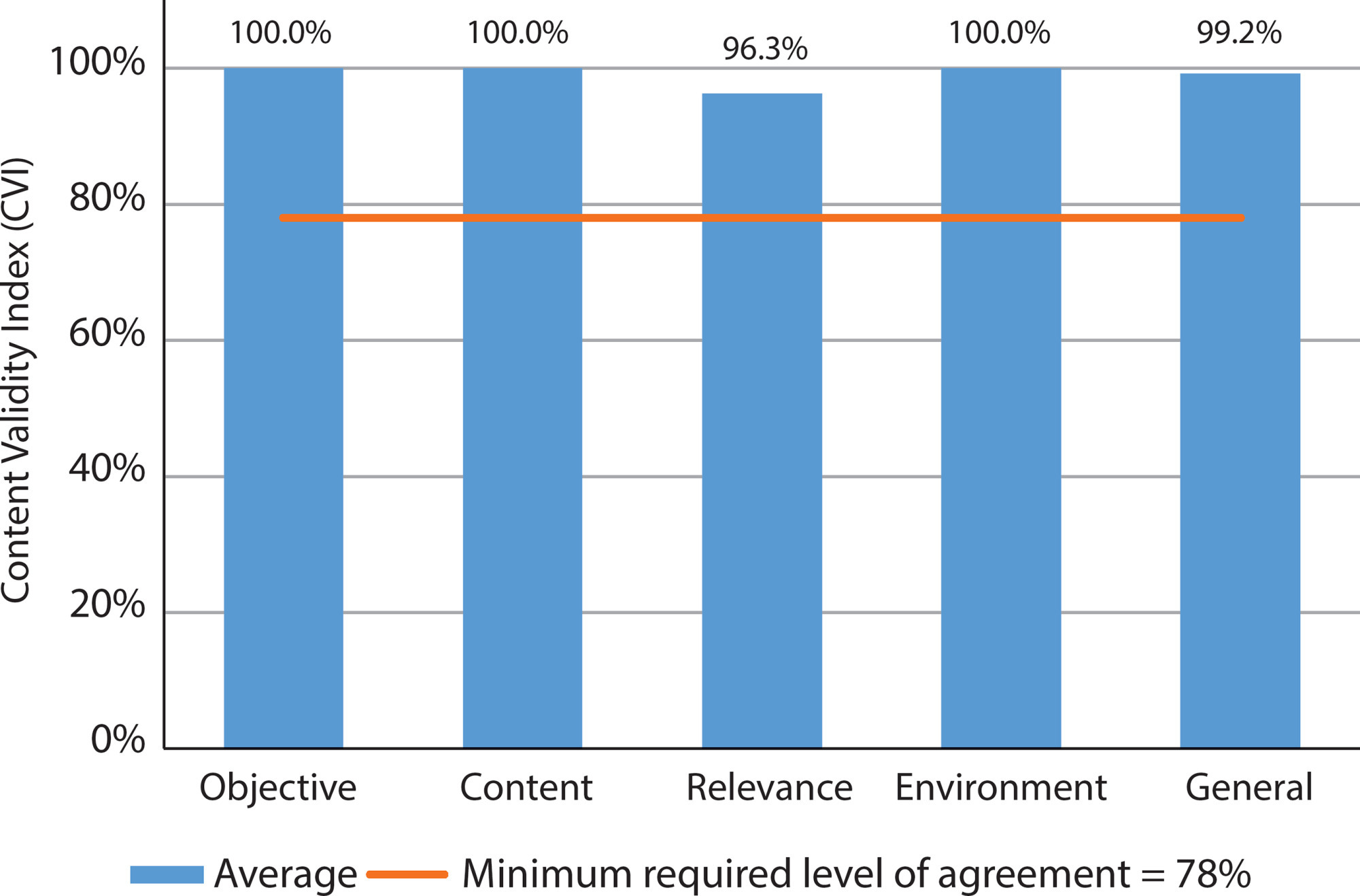
Search
Search in:
Nuvem de Tags
Adolescente (85) Atenção Primária à Saúde (239) COVID-19 (91) Criança (91) Cuidados de Enfermagem (269) Educação em Enfermagem (151) Educação em Saúde (139) Enfermagem (930) Enfermagem Pediátrica (86) Estudantes de Enfermagem (77) Estudos de Validação (131) Família (87) Idoso (208) Promoção da Saúde (99) Qualidade de Vida (104) Saúde do Trabalhador (86) Saúde Mental (145) Saúde Pública (82) Segurança do Paciente (150) Tecnologia Educacional (100)



